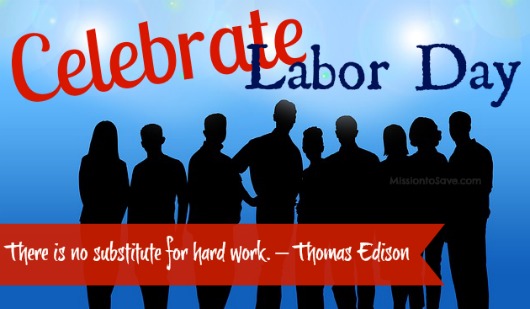Today’s readings: Genesis 1:26-2:3; Psalm 90; Matthew 25:14-30
One of the things that I remember vividly about my childhood is how hard my parents worked. My Dad worked more than one job at a time for several years. And in his main job, he was with the company for well over forty years, finally retiring from the company he worked for since his late teens. My mother, too, worked outside the home, and still does on a part-time basis. They encouraged me to work as well, and the experience of the work I did in my late teens is something that I carried with me throughout my pre-seminary work years, and continue, really, to benefit from to this very day. And that’s how work is supposed to be: participation in God’s creation, enhancing our human dignity, bringing forth our gifts, and helping us to be better people. Work should also help us to sustain our lives and our families, and to provide for their needs, including health care and retirement. The Church has consistently and loudly taught these truths about work ever since Pope Leo XIII’s ground-breaking encyclical Rerum Novarum, published in 1891.
As we observe Labor Day this year, though, I think we still have work to do on those principles. Far too many people don’t have the resources that work provides. The bishops of our nation publish a yearly Labor Day statement, and this year they write about the disarray in the world of work and the crisis that presents to the family:
“We behold signs that have become too familiar in the years following the Great Recession: stagnant wages, industry leaving towns and cities behind, and the sharp decline in the rate of private-sector organized labor… Millions of families still find themselves living in poverty, unable to work their way out. Poverty rates among children are alarmingly high, with almost 40 percent of American children spending at least one year in poverty before they turn eighteen. Although this reality is felt nation-wide, this year new research has emerged showing the acute pain of middle and rural America in the wake of the departure of industry. Once the center of labor and the promise of family-sustaining wages, research shows these communities collapsing today, substance abuse on the rise, and an increase in the number of broken families. ”
In his address to Congress last year, Pope Francis noted the crisis that is presented to the family in these days: “How essential the family has been to the building of this country! And how worthy it remains of our support and encouragement! . . . In particular, I would like to call attention to those family members who are the most vulnerable, the young. For many of them, a future filled with countless possibilities beckons, yet so many others seem disoriented and aimless, trapped in a hopeless maze of violence, abuse and despair. Their problems are our problems. We cannot avoid them. We need to face them together, to talk about them and to seek effective solutions rather than getting bogged down in discussions. At the risk of oversimplifying, we might say that we live in a culture which pressures young people not to start a family, because they lack possibilities for the future. Yet this same culture presents others with so many options that they too are dissuaded from starting a family.” (Address to Congress, September 24, 2015)
The bishops’ statement is relatively optimistic, citing efforts of solidarity and care for the most vulnerable of society as the bedrock of stabilizing the economy and strengthening the family. They write:
“As the fruits of solidarity and our care for one another increase, as we begin to make real impacts toward policies that help individuals begin stable families and live in accord with their dignity, the tired paradigm that fuels our national politics will be challenged. As Pope Francis has written ‘[e]very economic and political theory or action must set about providing each inhabitant of the planet with the minimum wherewithal to live in dignity and freedom, with the possibility of supporting a family, educating children, praising God and developing one’s own human potential.’ (Pope Francis, Letter to H.E. Mr David Cameron, British Prime Minister, on the Occasion of the G8 Meeting [17-18 June 2013]) With time, we will begin to restore a sense of hope and lasting change that places our economic and political systems at the service of the human person once more.”
Labor Day is in fact a wonderful time to step back and look at the meaning of work. Labor Day reminds us that we don’t have permission to write off human labor as some kind of necessary evil or a commodity to be bought and sold. We are reminded that the economy exists for the good of people, not the other way around. We must truly venerate all labor, that of our own efforts as well as that of others. We must vigorously defend the rights and dignity of workers, particularly of the poor and marginalized. And we must always offer all of this back to our God who created us to be co-creators with him. May we pray with the Psalmist this day and every day, “Lord give success to the work of our hands!”
